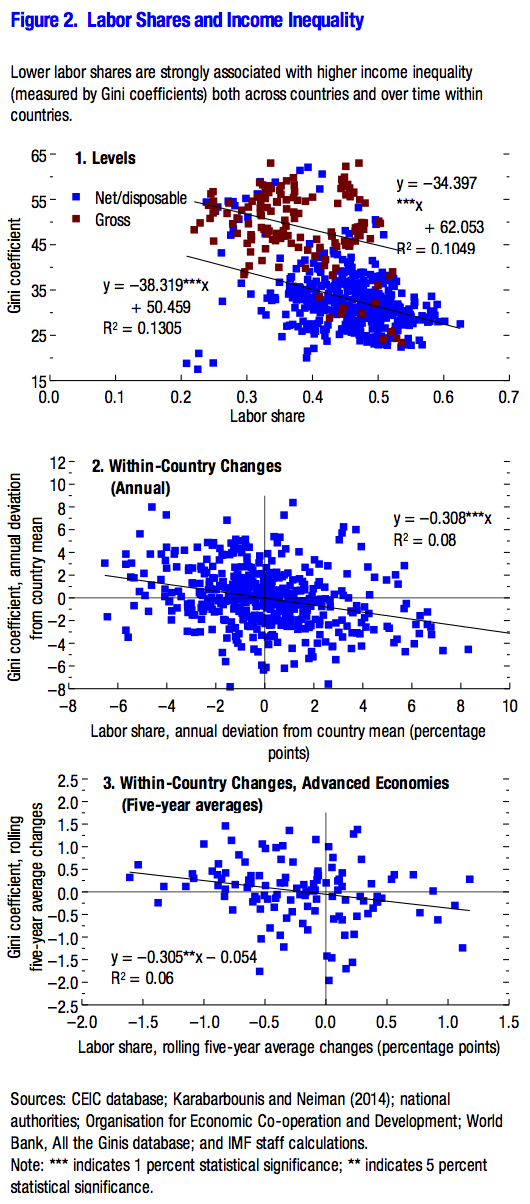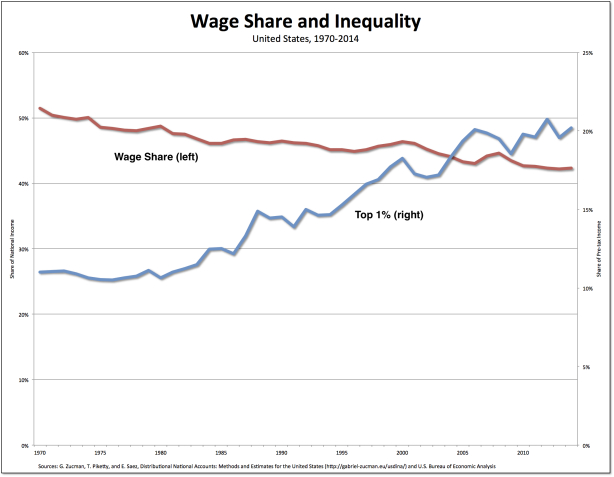From David Ruccio Apologists for mainstream economics (such as Noah Smith) like to claim that things are OK because good empirical research is crowding out bad theory. I have no doubt about the fact that the theory of mainstream economics has been bad. But is the empirical research any better? Not, as I see it, in the academy, in the departments that are dominated by mainstream economics. But there is interesting empirical work going on elsewhere, including of all places in the International Monetary Fund (as I have noted before, e.g., here and here). The latest, from Mai Dao, Mitali Das, Zsoka Koczan, and Weicheng Lian, documents two important facts: the decline in labor’s share of income—in both developed and developing economies—and the relationship between the fall in the labor
Topics:
David F. Ruccio considers the following as important: Uncategorized
This could be interesting, too:
tom writes The Ukraine war and Europe’s deepening march of folly
Stavros Mavroudeas writes CfP of Marxist Macroeconomic Modelling workgroup – 18th WAPE Forum, Istanbul August 6-8, 2025
Lars Pålsson Syll writes The pretence-of-knowledge syndrome
Dean Baker writes Crypto and Donald Trump’s strategic baseball card reserve
from David Ruccio
Apologists for mainstream economics (such as Noah Smith) like to claim that things are OK because good empirical research is crowding out bad theory.
I have no doubt about the fact that the theory of mainstream economics has been bad. But is the empirical research any better?
Not, as I see it, in the academy, in the departments that are dominated by mainstream economics. But there is interesting empirical work going on elsewhere, including of all places in the International Monetary Fund (as I have noted before, e.g., here and here).
The latest, from Mai Dao, Mitali Das, Zsoka Koczan, and Weicheng Lian, documents two important facts: the decline in labor’s share of income—in both developed and developing economies—and the relationship between the fall in the labor share and the rise in inequality.
I demonstrate both facts for the United States in the chart above: the labor share (the red line, measured on the left) has been falling since 1970, while the share of income captured by those in the top 1 percent (the blue line, measured on the right) has been rising.

Dao et al. make the same argument, both across countries and within countries over time: declining labor shares are associated with rising inequality.
And they’re clearly concerned about these facts, because inequality can fuel social tension and harm economic growth. It can also lead to a backlash against economic integration and outward-looking policies, which the IMF has a clear stake in defending:
the benefits of trade and financial integration to emerging market and developing economies—where they have fostered convergence, raised incomes, expanded access to goods and services, and lifted millions from poverty—are well documented.
But, of course, there are no facts without theories. What is missing from the IMF facts is a theory of how a falling labor share fuels inequality—and, in turn, has created such a reaction against capitalist globalization.
Let me see if I can help them. When the labor share of national income falls—the result of the forces Dao et al. document, such as outsourcing and new labor-saving technologies—the surplus appropriated from those workers rises. Then, when a share of that growing surplus is distributed to those at the top—for example, to those in the top 1 percent, via high salaries and returns on capital ownership—income inequality rises. Moreover, the ability of those at the top to capture the surplus means they are able to shape economic and political decisions that serve to keep workers’ share of national income on its downward slide.
The problem is mainstream economists are not particularly interested in those facts. Or, for that matter, the theory that can make sense of those facts.

